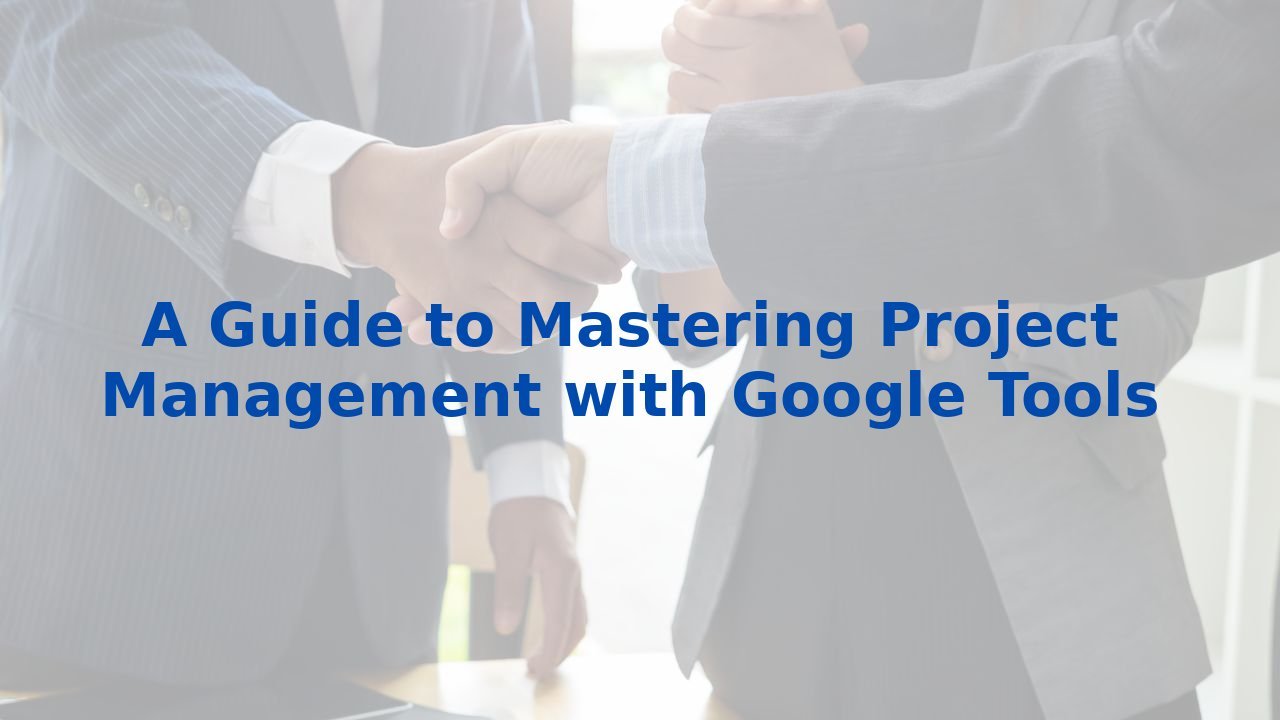A Guide to Mastering Project Management with Google Tools
A Guide to Mastering Project Management with Google Tools
In today's fast-paced business environment, effective project management is not just a skill; it's an essential ingredient for organizational success. The use of digital tools can streamline processes, ensuring that teams remain aligned and focused on their goals. When integrated with artificial intelligence (AI), these tools pave the way for unprecedented efficiencies and productivity gains.
Understanding the Business Process
Before diving into how AI can enhance project management, let’s take a moment to outline the fundamental business processes involved. Typically, successful project management encompasses the following phases:
Initiation, Planning, Execution, Monitoring, and Closure.
Each phase is critical, requiring a clear understanding of objectives, resource allocation, and progress tracking. This is where Google’s suite of tools comes into play, offering intuitive solutions for each stage of the project lifecycle.
Initiation: Laying the Foundation
In the initiation phase, defining the project scope, objectives, and stakeholders is paramount. Tools that facilitate collaboration and brainstorming, such as shared documents and online meeting platforms, empower teams to articulate their vision effectively. With AI, this phase can be enhanced through predictive analytics that identify potential risks and troubleshoot issues before they arise.
Planning: Mastering the Roadmap
The planning phase involves creating project timelines, assigning resources, and allocating budgets. Utilizing collaborative spreadsheets makes it easier to organize tasks and responsibilities. Here, AI can analyze historical project data to inform better decision-making — identifying patterns in resource usage or timelines that contribute to successful project completions.
Execution: Driving Results
Execution is where the bulk of the work takes place. Google tools allow for real-time updates and communication among team members. Imagine the efficiency gained when AI assists in automating routine tasks, setting reminders, or prioritizing responsibilities based on deadlines and workload. This not only saves time but also enables teams to focus on more critical aspects of the project.
Monitoring: Ensuring Accountability
Monitoring progress is crucial for adherence to the project timeline and budget. Dashboards that aggregate data from various sources provide a snapshot of key performance indicators (KPIs). AI-driven solutions can further enhance monitoring by providing insights into performance trends, thus allowing for swift course corrections when necessary. Here, you can see the true power of real-time data and predictive modeling in action.
Closure: Evaluating Success
The closure phase involves assessing project outcomes against initial objectives. Utilizing data analytics can uncover what worked and what did not, enabling continuous improvement for future projects. AI can assist in generating reports that illuminate valuable insights, thus fostering an environment of growth and learning.
The Role of AI in Enhancing Efficiency
As we've seen, AI has the potential to fundamentally transform every aspect of project management—from planning to closure. By automating mundane tasks, it frees up human resources to focus on creative problem solving and strategic planning.
"The integration of AI within your work processes isn’t just about enhancing productivity—it’s about elevating your entire organizational ethos."
Moreover, the ability of AI to analyze vast amounts of data quickly means that decisions can be data-driven, reducing the risks associated with gut-feeling based management. In an age where information is abundant, leveraging AI becomes less of an option and more of a necessity for competitive gain.
Training for the Future
However, merely adopting AI tools isn’t enough. Training employees to understand and utilize these technologies is crucial. Investing in AI training for your workforce helps them harness the full potential of these tools, enabling them to make informed decisions and maximize productivity. An informed workforce turns these advanced tools into valuable assets rather than just shiny appliances collecting dust.
Organizations that prioritize training will cultivate an agile environment where innovation can thrive. With AI certifications and training programs available, you can equip your entire workforce with the skills needed to navigate this rapidly changing landscape effectively.
As you embark on your journey of mastering project management through Google tools, consider not just the 'how' but also the 'why'. Leveraging digital tools and AI is not just about keeping up; it’s about leading the charge towards a more efficient, goal-oriented, and responsive organization.
By fostering a culture of continuous learning, your organization can ensure that it remains not just relevant, but also a pioneer in its industry. The future of project management is here, and it’s time to embrace it with open arms.



